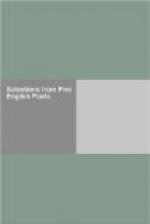Glides the smooth current of domestic joy.
The lifted ax, the agonizing wheel, 435
Luke’s iron crown,[52] and Damiens’ bed of steel,[53]
To men remote from power but rarely known,
Leave reason, faith, and conscience all our own.
NOTE.—Although many of the poet’s statements are greatly exaggerated, The Traveller is interesting because it contains beautiful descriptions and apt expressions of thought. The verse employed is the heroic couplet, the favorite verse of the eighteenth-century poets. The lines rhyme in pairs, and often a couplet expresses a complete thought. Each line contains five feet, or measures.
[1.] Scheld. The Schelde, or Scheldt, empties into the North Sea near Antwerp.
[2.] Carinthian boor. Carinthia is a province of Austria.
[3.] Campania’s plain. Campania includes, among other districts, the province of Naples.
[4.] My brother. Probably the poet alludes to his elder brother, Henry, who lived in Ireland. To him he is said to have sent the first part of his poem, from Switzerland.
[5.] Let school-taught pride, etc. i.e. let the philosopher pretend, if he will, that material things are of small importance.
[6.] Swains, a name used by poets for young men living in the country, especially lovers.
[7.] The line, the equinoctial line, the equator.
[8.] Idra’s cliffs. Idria is a town among the mountains in Camiola, Austria. Near it are mines of quicksilver.
[9.] Arno’s shelvy side. Shelvy, or shelving, means sloping gradually. Florence is on the Arno.
[10.] Either seems, etc. Either properly signifies one of two; it has occasionally been used for one of several, as Goldsmith uses it here.
[11.] And honor sinks, etc., a sentiment common in the poet’s day, but entertained by few persons in these times. Formerly, in many European countries, trade, even on a large scale, was considered belittling. A gentleman’s son might enter the Church, the army, or the navy, but he must not become a merchant.
[12.] My proper cares, my own, my personal cares.
[13.] Gelid, cold.
[14.] To winnow, to fan.
[15.] Sensual bliss is all the nation knows. This has never been true of the Italians. At the end of the fifteenth century Italy was the center of European civilization; at the close of the sixteenth she was exhausted and helpless; in 1748, by the treaty of Aix-la-Chapelle, she was divided among various European powers; after a long struggle the greater part of the country was united under Victor Emmanuel, who was proclaimed king in 1861. Italy has now, besides elementary and higher schools, twenty-one universities.
[16.] For wealth was theirs. Venice, Genoa, and Florence were cities of great wealth during the latter part of the Middle Ages.




